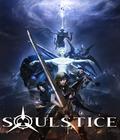Soulstice follows the story of two sisters, Briar and Lute, who were subjected to a magical ritual that transformed them into a Chimera. Effectively, it's a super-powerful human with two souls, with Briar in control of the body and Lute tagging along as a spectral guest of sorts. An organization known as The Order sends them to a city that is currently under siege by wraithlike monsters that are slaughtering everyone who comes nearby. It is up to the pair to defeat every foe in the room.
Soulstice knows exactly what it is going for — a Character Action Game, which is the genre used for titles like Devil May Cry or Bayonetta. Soulstice is heavily inspired by the former title. When you hop in, much of it seems very familiar if you played Devil May Cry 4 or DmC: Devil May Cry. The basic controls are very similar, down to having combos that I was able to do almost instantly because they had the same inputs. (The first upgrade that I bought for my basic sword was a renamed version of the iconic Stinger skill that Dante commonly uses.)
This isn't necessarily a bad thing, though. It's clear the developers are very big fans of the franchises, and they're trying to make something that falls into a similar niche. They have also included a lot of nice tweaks and quirks from those games, such as the blade flashing when you pause for an alternate combo or your speed naturally increasing as you run outside of combat. In many ways, it's difficult to discuss Soulstice without comparing it to Devil May Cry because that is what it is aiming for. It does include the scoring system from Platinum games (including hidden fights, with the highest ranking being Platinum) and a few touches from other games in the genre.
I'll focus on what makes Soulstice unique. Functionally, Briar and Lute fight as a pair. Briar is full-on Dante in her basic controls, but Lute has a more supportive function. Soulstice has an Arkham Asylum-like counter system where incoming enemy attacks have a brief window during which Lute can counterattack enemies by tapping a button. The actual parry depends on what is being parried, with some enemies being reflected and others being temporarily frozen, giving you a few extra precious moments to escape an attack. Certain enemies can't be parried unless you upgrade Lute's skills.
Likewise, Lute can create two energy fields: one Red and one Blue. The fields functional a lot like the Demon and Angel weapons in DmC. When activated around enemies, Lute seems to damage them inside of it, but more importantly, you need the corresponding field color to damage certain types of enemies who are otherwise immune. The longer the field is up, the more Lute's Entropy builds, and if it gets too high, she temporarily vanishes. This not only removes your ability to use her energy fields but it also disables her counters; that's a bad thing.
In place of the Devil May Cry-style system, Soulstice has a Unity bar that fills up as you use both sisters' abilities in unison, and it goes down if you take damage. As the Unity bar rises, you get special buffs or bonus abilities, such as Lute getting to shoot more energy blasts from her hands. At max level, you can use a Synergy attack, which is a powerful and somewhat cinematic attack that activates automatically if you land a specific combo while under max Unity.
Briar has a default longsword, which looks like a slightly more reasonable version of Cloud Strife's Buster Sword. It is fast and reliable and can be used with a button press. Your other weapon button uses your currently equipped secondary weapon. These weapons can be swapped in and out by tapping a button. The two we saw in the demo were a powerful but slow hammer and a whip that allowed for weaker but wide-ranging AOE attacks, with the former being better for single, strong foes and the latter for crowds.
Soulstice has a lot of potential. The demo makes it very clear that the developers are big fans of the genre and want to do their own take on it, combining familiar and new ideas. Our bite-sized demo let us take on some foes and a single boss, and overall, I was left pretty impressed. I look forward to seeing more of Soulstice ahead of its release later this year.
More articles about Soulstice











 Soulstice is a hack-and-slash action title that puts players in control of two characters at the same time.
Soulstice is a hack-and-slash action title that puts players in control of two characters at the same time.










